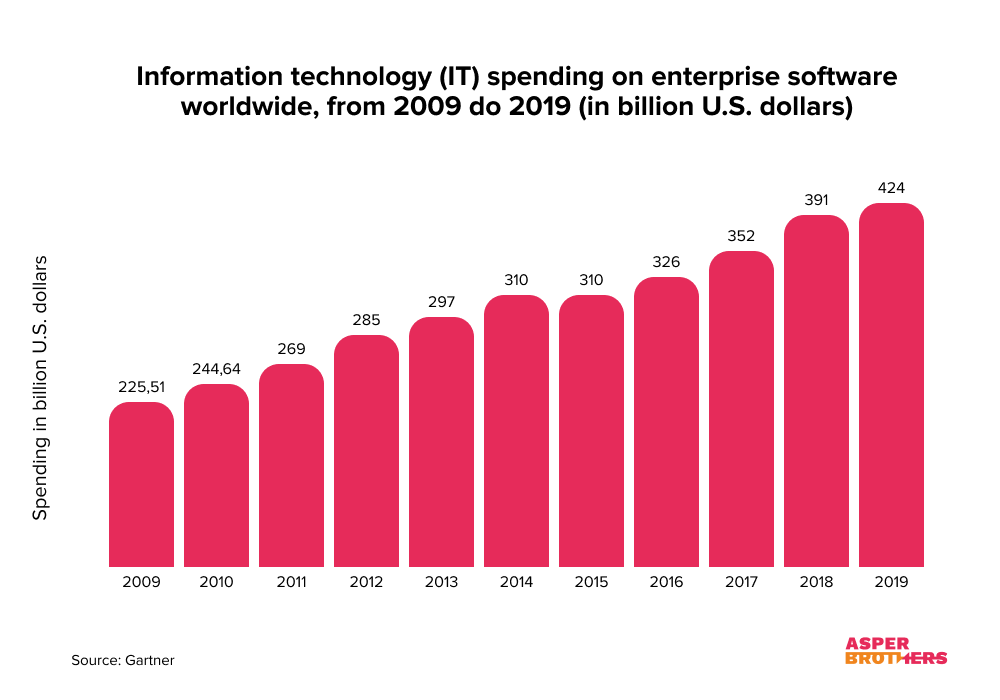Bespoke Software Development – Choosing Right Company
How frequently do you walk into a store, pick a suit, try it on and it fits you perfectly? Hardly ever...

Implementing a bespoke software solution provides many advantages, including enhanced automation, decreased delivery times, better employee engagement, and quicker value delivery to the business.
Tailored Software (also known as bespoke software, or customized software) refers to software that has been developed specifically for a single person, company, or organization. Because the application was designed just for your business, there are no limitations to what it can achieve.
Additional features and upgrades may be introduced throughout the product’s life cycle to accommodate changing company demands.
When categorizing custom software solutions, the degree to which they are customized is also considered.
Fully custom-made – This type of solution refers to software that was developed entirely from scratch. In most circumstances, using pre-existing libraries is much more practical than creating your own from the start. Due to the architecture’s uniqueness, only a few software projects need a complete rewrite.
Semi-custom – The vast majority of customized applications are built using a semi-custom technique, which is by far the most prevalent. To save time and prevent starting from scratch, this kind of solution leverages existing software. By using pre-developed libraries, the development team may concentrate on other, more critical project areas.
Custom software systems – These solutions are used by some companies that rely on software provided by other organizations with comparable business requirements. Rather than beginning from scratch, this software development team uses an existing application.

Enterprise digitization is a global trend joined by more and more companies, regardless of size. Spending on software is growing every year. / Data Source: Gartner
In terms of functionality, how does tailor-made software vary from pre-packaged software?
Off-the-shelf software is the tool for you if you want something that is immediately usable and capable of handling many user profiles.
It may be advantageous for small businesses. Because canned solutions are pre-configured, they are limited to performing broad tasks due to their widespread usage across sectors.
However, according to a different study, 80% of shelf software features were rarely or never used.
Customer service, sales, and staff productivity may all be improved with the aid of modern technology. The amount of time that this technology can save you is limited, and the cost is inversely proportional to the number of users in this approach.
Due to a shortage of IT personnel to assist with product deployment and software development, the process may take longer than anticipated. Because this kind of software is seldom updated, its usefulness declines with time.
Dedicated software means mainly better adjustment of features to the specific requirements of a given company. Software developed from scratch identifies unique processes and standards in a company, transferring them to the digital world, implementing automation and efficient data processing. As a result, the company achieves its business goals more efficiently, and the managers make better decisions based on real data. COO, ASPER BROTHERS Let's Talk
Based on the findings of a survey from Information Technology Decision Makers released by Appian, 87% of IT leaders consider that by developing a custom software you are propelling innovation in business technology. This is the main cause companies look into the advantages of creating tailor-made software.
Deciding whether or not your company needs custom software can be a challenge. To assist you in making an educated selection, we’ve created a list of benefits of such software.
Even if you just want a single new custom software system to address a specific issue in your business, the systems designed expressly for you can seamlessly interact with your existing systems. As a result, business processes may be enhanced and software-related problems avoided.
As a company expands, its IT needs to increase proportionately. If your business is just getting started and has no plans to grow, off-the-shelf software may suffice. On the other side, this kind of software may become a problem when your business develops and requires support for changing business demands. Additionally, when your business expands, the cost of licensing package software may become too expensive. As a result, customized software development helps guarantee that organizational growth is not stifled or constrained by a software shortage.
As a business owner, you are tied to the developer of the products you buy in several ways. As a consequence, you have no say over pricing, user agreements, or terms and conditions. If, for example, the developer goes out of business or ceases to update the software you use, your company’s operations may be impacted until a replacement source is identified. Once developed, tailor-made software is yours to use indefinitely and in any manner. Even if you include the expenses of care and improvements, your concerns are likely to be much reduced.
By concentrating on the most critical features, you can ensure that your program is intuitive. By simplifying the user experience and streamlining the data entering process, confusion and guessing are eliminated. Streamlining and automating the multiple facets of a challenging process, formerly time-consuming operations may be done in a fraction of the time.
Commercial software is often licensed, meaning that money is required to use it. You have complete control over the code when it comes to custom software development. As a consequence of the tailor-made software solution, your intellectual property portfolio and financial position are enhanced. Additionally, you’ll get the chance to network with other industry leaders and develop marketing plans for your own products. When you own the source code, you have greater control over how the program is utilized than when you purchase a packaged version.
By using customized software, you may be able to distinguish your company’s services from those of your competitors. Consider developing a self-service portal with a professional appearance and feel to enable self-service access to data and other services that your consumers would not have access to otherwise. Alternatively, you might direct your efforts inside by developing a platform for continuing education that facilitates both new employee training and knowledge exchange among more experienced employees.
If you develop custom software, be prepared to commit a significant amount of money upfront. This is a long-term investment. No extra fees or expenditures are connected with employing an off-the-shelf solution since no new hardware or license is required. Despite their high initial costs, the benefits of custom software far surpass any possible disadvantages of commercial software. By implementing solutions that are tailored to your individual requirements, custom software enables your team to perform more efficiently and effectively.
Finally, it was created to meet your individual company requirements, assist you in overcoming obstacles, and assist in achieving specific business objectives.

Dedicated solutions come with not only benefits but also many challenges. That’s why it’s so important to find the right partner to guide your company through all these challenges. / Data Source: GoodFirms.co
Software purchased on the open market is inherently insecure. Due to its extensive use, a popular software solution is not necessarily safe. If you depend only on built-in solutions, your business’s security may be affected. Each time you add a new software solution to your present technological stack, you should assess the possibility of encountering dependency issues.
Due to documented vulnerabilities in publicly accessible APIs, hackers often target commercial off-the-shelf goods. The hacker obtains an edge by exploiting holes in widely-used software that grants access to tens of thousands of firms’ data. On the other hand, custom software might benefit from “security by obscurity” if it is only utilized by a few individuals inside your organization.
One of the most significant benefits of custom software development is the ability to distinguish it from generic alternatives. When you are unique, your safety is significantly increased.
Businesses are constantly adjusting and developing to remain competitive. Most software is not suitable for most users. Carrying a heavy load may be difficult with a pre-made solution; however, tailor-made software can adapt to these changes.
A solution tailored to your business’s specific requirements will evolve with your company. When investing in off-the-shelf software, you end up being at the mercy of the developer from which you bought it. Developing custom software enables you to gain control.
You will no longer have to depend on others to keep your software current or to maintain it for you. You might simply collaborate with a development team responsible for maintaining and developing your solution as your business expands.
There are 5 types of tailored-made software that companies from various industries can benefit from.
Based on the finding of the Appian report we have mentioned earlier, custom software creates an obvious advantage for a company operating in financial services (48 percent) or manufacturing (41 percent). They are closely followed by the telecommunications industry (39 percent) and the healthcare/pharmaceutical sector (38 percent).
A content management system allows companies to update their websites. A good CMS enables the user to add new posts, create web pages, or add new pictures without requiring a web developer. This type of tailor-made software manages all the essential tasks.
CRM software allows companies to monitor their customers, referrals, prospective clients, and vendors for sales and marketing departments. This type of solution organizes all the customer information into just one repository enabling you to systematize and manage relationships better. In addition, it helps to automatize standard processes and monitor performance and productivity.
Enterprise resource planning (ERP) solutions can be used to oversee the daily operations of enterprises, including accounting, risk management, audit and compliance, procurement, supply chain operations, and project management functions. It allows the merger of existing business processes into a single customized system while reducing unneeded data replication.
Operations management software is developed to support organizations looking to automate manufacturing capabilities or manage their business procedures. An operations management solution’s primary focus is to ensure that a company’s operations are practical and efficient.
Enterprise software supports the business by improving the business and management reporting jobs. This software can help organizations with online payment processing, providing interactive product catalogs, automated billing solutions, and security.
It is critical to assess your business’s size and scalability. Your long- and short-term objectives, as well as your vision, and business model all play a role in determining the ultimate choice. In the long term, the advantages of tailor-made software exceed the development expenses.

How frequently do you walk into a store, pick a suit, try it on and it fits you perfectly? Hardly ever...
What is Digital Transformation? The term digital transformation often gets associated with buzzwords like AI, blockchain, cloud, and automatization. But what...
Outsourcing web development has been a worldwide trend for many years because of several advantages over using a local team for...